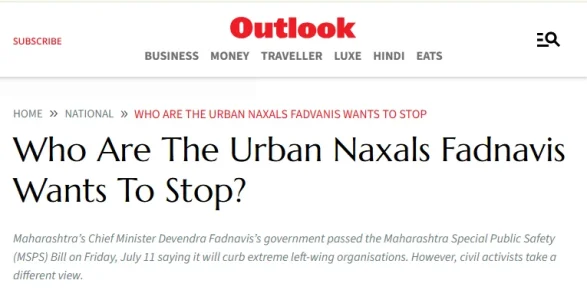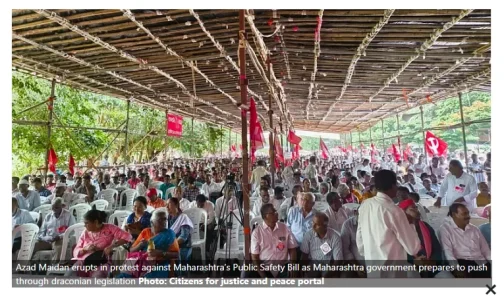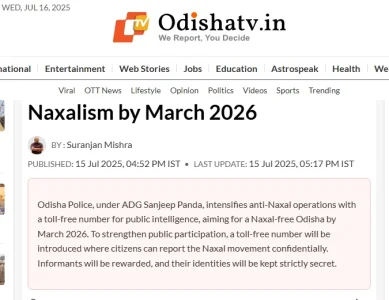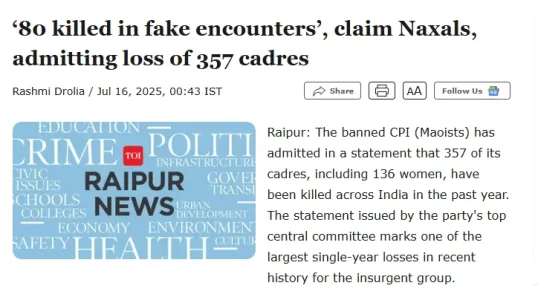Now Urban Naxals are havnig their Turn. This need to be done in national level.


On Friday, July 11, when the Maharashtra State Assembly cleared the controversial Maharashtra Special Public Safety Bill (MSPS), Chief Minister Devendra Fadnavis addressed the worries of civil rights watchdogs who say it will clamp public dissent and criticism of the ruling government.
“I assure the House that we will not allow the misuse of this law. I request the House to pass this Bill unanimously,”
promised Fadnavis, who had tabled the Bill, said after a 120-minutes-long discussion on the draft legislation in the Assembly.
The
CM made a convincing case to the legislators because a day later the MSPS was also passed by the Legislative Council. The MSPS Bill now awaits only the state Governor’s assent and then it will be law.
The objectives of the MSPS state that it’s aimed at curbing activities of “left‑wing extremist organisations” in urban areas who provide logistical support and shelter to naxal elements in Maharashtrian cities. Critics have said that the measure is a threat to fundamental civil liberties and could be misused to silence government critics.
What does the MSPS Bill say?
The MSPS Bill gives the state government power to classify any person(s) or organisation as “unlawful”, making membership in such a designated organisation a criminal offence punishable by two to seven years jail time and fines of two-five lakhs rupees. Other activities that can be deemed criminal under MSPS are: raising funds for or assisting such organisations. The Bill makes all offences covered by it non-bailable, meaning police can arrest suspected persons without a warrant and the arrested individual(s) would have to go to court to procure bail after arrest.
“Unlawful activity” as defined by the Bill covers acts of violence and vandalism, and also “words either spoken or written,” gestures, or “visible representation” of any “extreme left-wing” values or groups that the law says are a public menace. What constitutes public menace or the criteria for a person or organisation being declared so is not enumerated in the law. However, those accused under MSPS could face immediate jail time, seizure of their property, immovable and movable, eviction from premises, and financial forfeiture.
Urban Naxals and the MSPS
Naxalism is described in the Bill’s statement of objectives as “not only limited to remote areas” but with an “increasing presence in urban parts” through “front organisations.” The terminology used is reminiscent of the Unlawful Activities (Prevention) Act, a counter-terror act that has been invoked to jail over a dozen critics of the
Indian government thus far including but not limited to Umar Khalid. The MSPS, critics say could have more severe consequences, as it also criminalises peaceful dissent.
The MSPS Bill’s Passage
The Maharashtra CM first introduced the MSPS Bill in 2024 during the State’s Monsoon assembly session. Two months after his state election win in October, Fadnavis re‑tabled the bill and sent it to a joint select committee. From March through June, the JSC held five meetings on the Bill and received over 1200 public submissions, including from the People’s Union for Civil Liberties (PUCL) to withdraw the bill.
Token Amendments, Lasting Concerns
Despite the pouring in of suggestions for the MSPS Bill, the JSC only approved three changes. The long titled was amended to specify “Left‑Wing Extremist organisations or similar organisations,” the composition of the advisory board was changed to include one retired
High Court judge, one retired district judge, and one government pleader, and the rank of the investigating officer was raised from sub‑inspector to deputy superintendent of police.
But legal experts say the bill is problematic at its core.
What is Urban Naxalism, and is it a Threat to Democracy?
Many say that the MSPS’s broad definitions of “left-wing” extremism and
“urban naxals” could be misused to target political adversaries, students, journalists, or activists who are critical of government policies or question large infrastructure and corporate projects.
Vinod Nikole, CPI(M) MLA, strongly the Bill in the Assembly. “This is nothing but a new weapon to silence dissent. Who decides who is an Urban Naxal? Tomorrow, farmers, workers, students, and even MLAs opposing government projects can be labelled anti-state," he said.
Senior Counsel Dushayant Dave has added that the law was “constitutionally flawed” and “brought only for the purposes of following a false narrative and this kind of argument that there is
Urban Naxalism.”
Former Bombay High Court Judge Justice Gautam Patel said: “They are trying to instil fear in us—fear of terrorism, or fear of unlawful activities.” He went on to say the pertinent question at this time was: “What is it that the government is afraid of? That they’ll be called to account? That somebody will ask questions, uncomfortable questions that you can't answer? About how they spend money and how they conduct themselves?” He added that “Those are legitimate questions that I'm entitled to ask as a citizen.”
Existing laws and unanswered questions
Many critics point out that Maharashtra already has specific and stringent laws to deal with urban violence. Both the Unlawful Activities (Prevention) Act and the Maharashtra Control of Organised Crime Act are designed to combat terrorism and organised crime.
The government has “a raft of statutes including Maharashtra-based statutes,” said Justice Patel, adding that the government “do not need to add to them nor do they need to add to the complexity of them.” Patel pointed out that adding more laws would not help the prosecutors. “Let the Maharashtra government tell us how many of these terror cases it has successfully prosecuted…. compared to the number that it has initiated, how many have been taken through to trial?” he said.
Activists have also pointed out that criminalising extremism without addressing the root socio-economic causes of issues have rarely resulted in sustained change. Activists say the state’s persistent neglect of the interests and demands of its adivasi and marginalised communities, misuse of tribal‑welfare funds and failure to prosecute exploitative contractors and complicit officials must be addressed to curb the Maoist movement.
“I don't approve of any violence in the name of Naxalism and I strongly condemn it,” said Dave, adding that, “at the same time, the state should not create a situation where instead of dealing with a problem which has really brought about Naxalism, you are trying to kill it in a very incorrect and improper way.”He added the state must “go to the real causes for this problem, try and address them and make sure that it (Naxalism) does not lure people; people feel that justice will be given to them for violation of their rights in tribal and rural areas, which does not happen. You (the state) must give them alternative, genuine jobs, alternative places to live which are good places, decent places.”
Much Ado About Nothing?
Some legal experts say that the agitation around the MSPS “reeks of much ado about nothing.” Senior Counsel Pinky Anand says the bill “falls squarely within the policy prerogative of the state,” while adding that “as the unlawful work hard to advance their modus operandi, it is incumbent upon the state to inculcate in itself reforms necessary to fight such challenges.”
Anand said that the MSPS has adequate safeguards, ensuring checks and balances, and proportional traverse into areas of liberty. “The MSPS provides for issuance of notice, right of personal hearing, and the right to make representations. These rights and subsequent proceedings are of course open to appeal by way of writ petitions before the High Court and the Supreme Court,” Anand said.
Judicial challenge ahead?
With the governor’s assent expected within days, Opposition parties and activities have said they would move the Bombay High Court against the MSPS Bill. Legal experts expect them to win.
“According to me, on a cold feeling of it, it can't pass a constitutional test,” said Justice Patel.
Dave, too, said the law if challenged before an “fiercely independent court” would fall foul of the Constitution, including Article 13: that laws cannot be unconstitutional.







